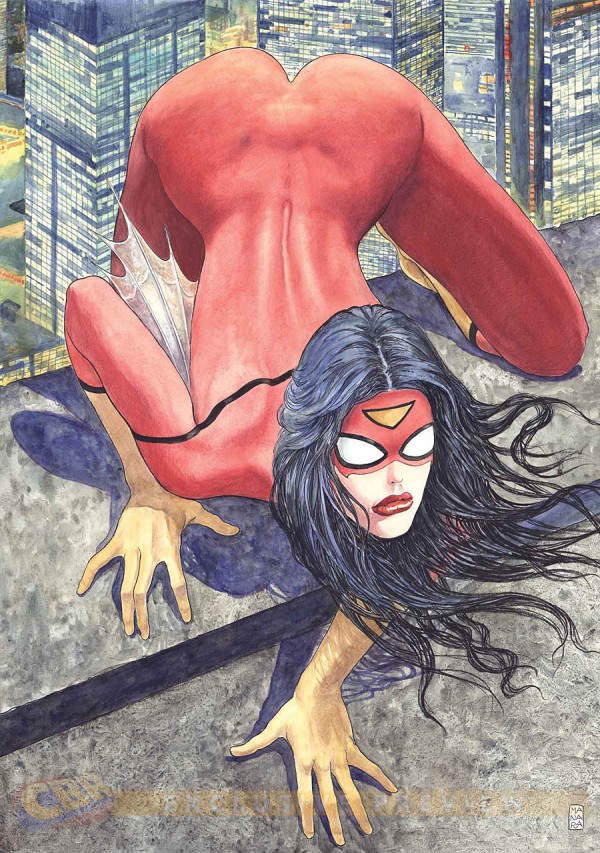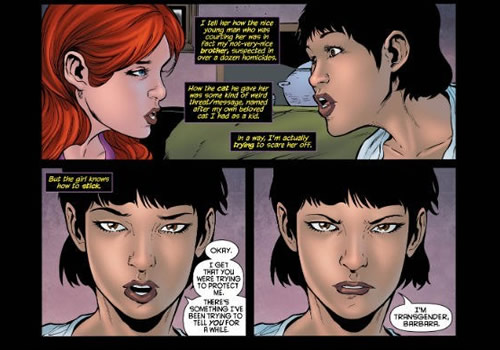That’s a pretty wild stab, I know. To ask that question, you may as well ask, are comics a little racist as well. And why don’t we lump all of that together.
Now, let me be clear on this. Comic book writers and artists themselves are not necessarily homophobic/transphobic/racist/sexist (though, in that last one, there’s been some questionable things that artists have done with female characters, example the latest Spider-woman cover).
The cover is reminiscent of a Catwoman cover that was all boobs and butt. Also, see Mary Jane’s famous pose that was imitated (with hilarious results). Needless to say, comic book artists and editors have a lot of work still ahead of them in not pulling the sexist card. A reminder, a pose that appears sexy doesn’t necessarily mean powerful and empowering. If you think to yourself “yeah, this pose is gonna be hot” then there’s a good chance that you shouldn’t do it.
Regarding the other aspects of phobias and racism, comics also still have a long way to go. There has been same sex marriages in Marvel Comics, but DC Comics is lagging behind. Image Comics seems to be further ahead in this regard. DC almost had one, but thanks to editorial, superheroes obviously can’t have happy lives (unless they’re Superman and they’re boning Wonder Woman… gah, that’s so stupid).
Case in point, fans of Batwoman have been waiting for Maggie and Kate to get married, but the idea of that happening was tossed out the window thanks to editorial.
There is an explanation for the lack of same sex marriages in books, and comics. Many publishers will make sure the content of the book is a good push for world wide publication. And often times, thanks to certain countries laws (I’m looking at you, Russia) same sex marriage is illegal and any publication, whether it’s factual or fictional, that seems to shed a positive light on gay and lesbian relationships, is seen as propaganda.
For books, like the Harry Potter series, that can be a problem. It was never revealed openly in the books that Dumbldore was gay, but it was something that J. K. Rowling knew was a part of the character. Still, writing it into the book may have had it banned outright in certain countries and even jurisdictions in Canada and the United States (possibly not Canada, but you never know). It would have given homophobic bigots something else to complain about instead of magic.
For comic books, it might be a little different. Comics don’t have the sales push that a best selling novel would have. Comic book companies aren’t worried about breaking ground in a nation (or continent) that they don’t have a chance of selling a book in. So they often don’t have to worry about countries and their laws about same sex marriage or same sex relationships. If you sell 50,000 copies of an issue in it’s first two months of release, then you did good. And between Canada and the United States, there’s way more than 50,000 comic book readers out there.
Still, comics aren’t doing that well with showcasing a transgender person in their pages. Gail Simone, former writer of Batgirl and current scribe for Tomb Raider and Red Sonya, did give us a trans-woman in the pages of Batgirl. And from what’s been said, that character will stay in those pages under a new creative team.
I’ve read through a list of other transgender characters who have appeared over the years, but as far as I can tell, Alysia Yeoh is the only one I can find that doesn’t have a magical transformation, is reincarnated as a man/woman, or is taking a fictitious drug to help her remain a woman (though Shvaughn Erin from the 1970s Legion of Superheroes run can count as she is the one taking the fictitious drug, also honourable mention to Comet during Peter David’s run on Supergirl). Sadly, none of these characters mentioned are the title character. There was only one I could find, Lord Fanny from the Invisibles, who was born male but becomes female in order to gain inheritance to her family’s witch abilities. That, however, was a Vertigo comic, and Vertigo had a lot more risk taking to it.
So, as of yet, there is no comic which has a main character or title character, currently running who happens to be a trans-woman or trans-man. At least not that I know of (if you know of one, let me know in the comments, or reblog this and add to it, or just hit me up with a message).
Now, onto the last one. Comics really aren’t racist. Or are they. Comic titles will come out with people of colour, but often the title dies out quickly. When that happens, a lot of fanboys will cry out that there’s no market for PoC in comics (or women, if the title is one for a woman). Never, however, do they say anything of the sort if a title staring a straight, white, male fails. In that case it was due to poor writing, poor artwork, lack of availability at comic shops. And all of those can be true. They’re also true for titles staring women, and titles staring PoC that end up being cut well before their time. (I’ll do another write up on that double standard later)
But there’s also another reason why. Sadly, comics have an advertising budget, and they’ll lump a vast majority of their advertising dollars in their sure things. For DC, that’s Superman, Batman, Justice League, Green Lantern and Wonder Woman. For Marvel, that’s any X-Title or any Avengers tie in title (Captain America, Iron Man, Thor) or Spider-man titles. Now, you just can’t have a company say “We’re doing a Batman title, you should buy it” and expect it to become a hit. Consumers need a reason to buy said thing. Of course, most consumers will be interested it someone says there’s a new Batman title. But if DC pushes for a Black Lightning title, for example, they’d have to back it up with some advertising if they want it to sell. Marvel, on the other hand, really seems to be pouring their advertising budget into their new titles, such as recent ad campaigns with Miss Marvel. Marvel’s been taking a lot of risks and it shows that it’s paying off.
It’s also true that we, the consumer, also have to help support new titles. That can be difficult, thanks in part to an old stigma about comic book shops. Many comic book shops are changing and being more open and welcome to all genders and people of colour, but there’s still the stigma about how uninviting they can be. And there are shops that are like that, who scoff at women, don’t understand why a person of colour would be buying a comic, or being outright rude to someone who they may feel isn’t a comic’s demographic.
The onus of change isn’t on the consumer. It’s at both the retail level, and at the publishing level. Make it more accessible and inviting to go into a comic shop. And as far as publishers go, try to make your creative teams have more diversity. More women and more people of colour working on your titles. You are not losing out by doing this, you are in fact bringing new ideas along with new talent.
I will admit, comic publishers have taken some massive steps regarding inclusion for LGBT, and people of colour, but they’ve still got a long way to go.


















Johnson
August 24, 2014 at 11:21 am
I don’t have a problem with homophobic comics if there are any because no one forces me to read them, I’ll just read a non-homophobic comic instead.
I do have a problem with all those who push political correctness into society and everyone’s daily lives, however, because they’re restring our freedom of speech while not giving us a choice.
Tim
August 24, 2014 at 12:12 pm
There`s these two things you use, and neither is really being used in the manner with which they are understood. Political correctness has been deemed an evil due to the fact that people feel it`s being pushed on them. Political correctness is, in fact, equal to not being rude. Being rude is often seen in society as something which is frowned upon. Being politically incorrect, same thing. It`s frowned upon, bad manners, and something which shouldn’t be promoted.
The other is Freedom of speech. Freedom of speech has evolved into the simplest “I can say what I want”. That’s not what it means, though. You’re above comment, the second paragraph is in itself contradictory. You want your freedom of speech, but you deny it to anyone who might want “political correctness”. Freedom of speech, however according to the First Amendment of the United States Constitution, states…
If you want more information, read here.
Nowhere does it say that if someone says something racist, homophobic, transphobic, or sexist that I cannot call them out on it and point out how homophobic, transphobic, racist or sexist it was. If that further goes to prove that the individual who said it is a bigot, then so be it (what a person says and what a person is, are not always the same thing).
Governments cannot jail you for saying something (there are countries that are exceptions to this rule). But there are some laws which restrict speech. These are based on child pornography, defamation, libel, slander, and such. If you say a person fucks goats and you have no proof or you know it’s a lie (or are proven to be lying), this is called slander. If it’s written in an article, then that’s called libel.
When it comes to fiction, sure you can have characters that are racist, transphobic, homophobic, or sexist. But you can also showcase how awful and wrong that is in the narrative. That it goes against social graces. That it is something that is rude and should be frowned upon.